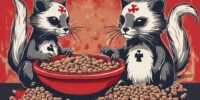What Dietary Supplements Your Ferret Might Need
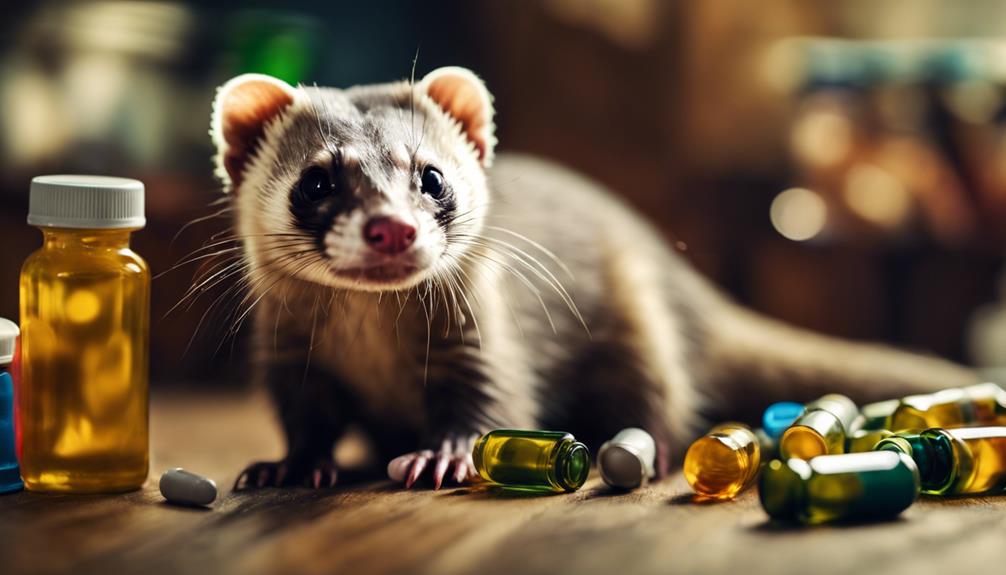
Essential Dietary Supplements for Ferrets:
- Vitamin A
- Omega-3 Fatty Acids
- Vitamin D
- Probiotics
- Taurine
- Iron
- Calcium
These are crucial for your ferret’s health and well-being.
Vitamin A
Is your ferret getting enough Vitamin A for a healthy life? Let’s dive into why this vitamin is crucial for your furry friend’s well-being!
What does Vitamin A do for your ferret?
- Supports good vision
- Boosts immune function
- Maintains reproductive health
- Helps in tissue growth and development, including skin and mucous membranes
Why is Vitamin A important for ferrets?
- Prevents issues like poor coat condition, night blindness, and infections
- Ensures overall health and vitality
- Supports the immune system and vision
Make sure your ferret gets the right amount of Vitamin A through a balanced diet or supplements to keep them happy and healthy. Prioritize their well-being by meeting their dietary needs for this essential vitamin!
Omega-3 Fatty Acids
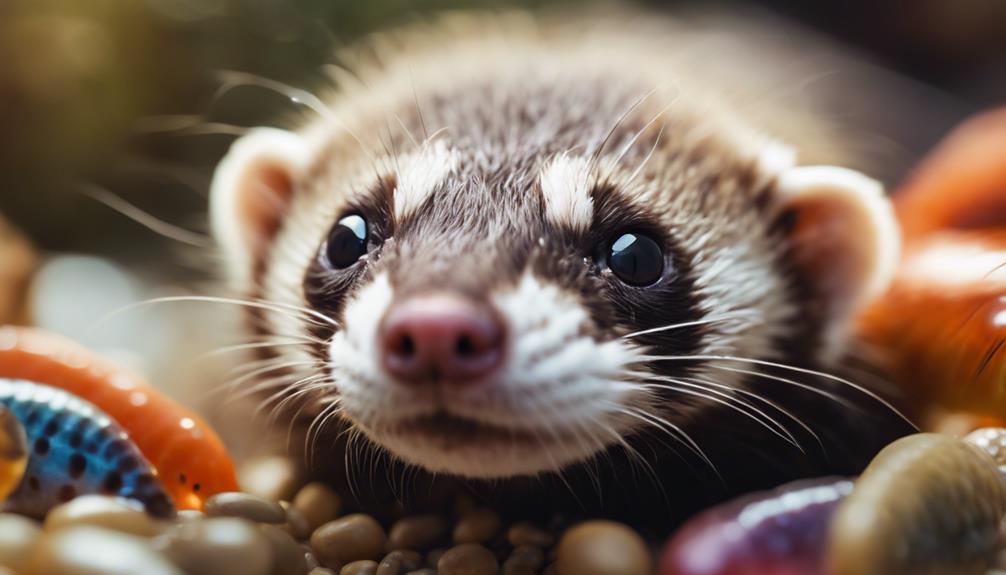
Unlock the Secret to a Healthier Ferret: Omega-3 Fatty Acids!
Hey there, ferret lovers! Did you know that just like Vitamin A, Omega-3 Fatty Acids are super important for keeping your furry friend in tip-top shape? Let’s dive into why these special nutrients are a must-have for your ferret’s well-being:
Benefits of Omega-3 Fatty Acids for Ferrets:
- Say Goodbye to Joint Pain: Omega-3 fatty acids have anti-inflammatory powers that can help ease joint discomfort and stiffness as your ferret gets older.
- Glowing Skin and Coat: These fatty acids work wonders for your ferret’s skin and fur, giving them that shiny, healthy look we all love.
How to Add Omega-3 Fatty Acids to Your Ferret’s Diet:
- Fish Oil Is the Way to Go: Fish oil is packed with EPA and DHA, the essential omega-3 fatty acids your ferret needs.
- Consult the Vet: Before making any changes, chat with your vet to get the right dosage for your unique ferret.
- Long-Term Health: Including omega-3 fatty acids in your ferret’s diet can help them stay happy and healthy for years to come.
Give your ferret the gift of Omega-3 Fatty Acids and watch them thrive!
Vitamin D
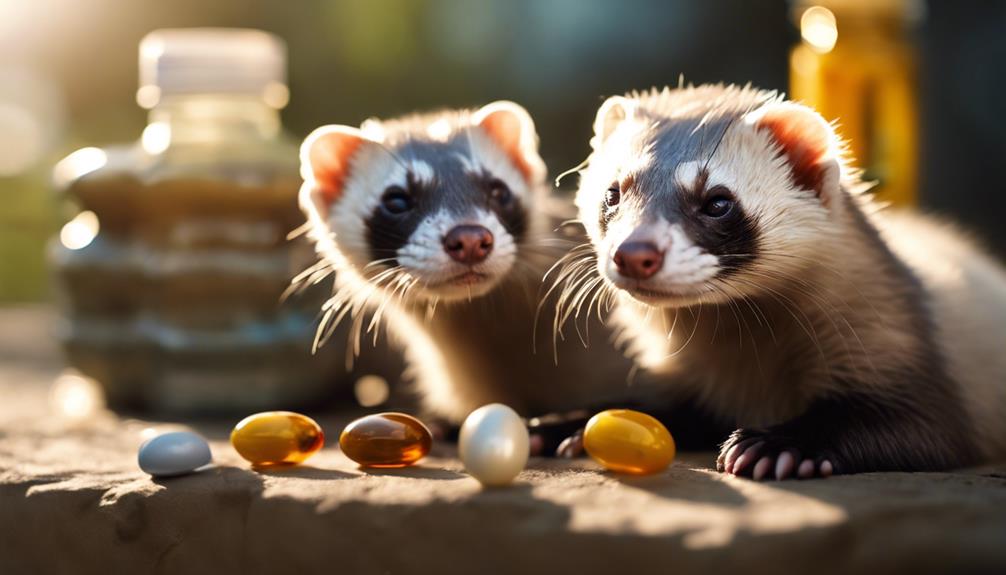
Vitamin D is essential for various bodily functions in ferrets, including bone health, immune system support, and hormone regulation.
Sources of Vitamin D for ferrets can include high-quality commercial ferret foods, as well as exposure to natural sunlight or UVB lamps.
Signs of Vitamin D deficiency in ferrets may manifest as weak or brittle bones, lethargy, muscle weakness, and poor growth.
Importance of Vitamin D
Why is Vitamin D Important for Your Ferret’s Health?
Hey there, ferret lovers! Did you know that Vitamin D is super important for keeping your furry friend healthy and happy? Let’s dive into why it’s crucial and how you can make sure your ferret gets enough of this essential vitamin.
Why Vitamin D Matters for Ferrets:
- Vitamin D helps keep your ferret’s bones strong and healthy.
- It plays a key role in calcium absorption, which is vital for bone development.
- Ferrets need Vitamin D to prevent bone disorders and maintain overall well-being.
How to Ensure Your Ferret Gets Enough Vitamin D:
- Sunshine Time:
- Let your ferret spend some supervised time outdoors to soak up the sun and naturally produce Vitamin D.
- Remember, too much sun exposure can be harmful, so keep it brief and safe.
- Dietary Sources:
- Opt for commercial ferret diets that are fortified with Vitamin D.
- Consider adding Vitamin D supplements to your ferret’s food under veterinary guidance.
- Supplementation:
- Talk to your vet about the right Vitamin D supplements for your ferret’s needs.
- Follow dosing instructions carefully to avoid over-supplementation.
Sources of Vitamin D
Where Can Ferrets Get Vitamin D?
Ever wondered how ferrets stay healthy and strong? Well, one key player in their well-being is Vitamin D! Let’s explore how ferrets can get this essential nutrient.
- Sunshine Time: Did you know that letting your ferret soak up some sun can help them make Vitamin D through their skin?
- Supplements: Adding special Vitamin D supplements made for ferrets to their meals can ensure they get enough of this vital nutrient.
- Food Boost: Some ferret foods are enriched with Vitamin D, offering a natural source of this important vitamin.
- Absorption Action: To make sure your ferret’s body can use Vitamin D effectively, pair it with a balanced diet for optimal absorption.
Signs of Deficiency
Signs Your Ferret Needs More Vitamin D
Hey there! Have you noticed your ferret feeling weak or not as playful as usual? It could be a sign that they need more Vitamin D in their diet! Let’s learn more about why this nutrient is super important for our furry friends:
- Weakness and lethargy: If your ferret seems tired all the time, it might be due to a lack of Vitamin D.
- Poor bone development: Vitamin D helps keep their bones strong and healthy, so deficiencies can lead to issues with bone growth.
- Bone deformities: Without enough Vitamin D, your ferret’s bones may not develop properly, causing deformities.
- Dental problems: Insufficient levels of Vitamin D can also affect their teeth, leading to dental issues.
- Weakened immune system: Vitamin D plays a role in supporting their immune system, so low levels can make them more vulnerable to illnesses.
How can we help our ferrets get enough Vitamin D?
- Make sure they have a balanced diet that includes foods rich in Vitamin D.
- Consider using Vitamin D drops or fortified foods to supplement their diet and ensure they’re getting enough of this essential nutrient.
- Keeping an eye on their overall health and behavior can help catch any signs of deficiency early on.
Probiotics
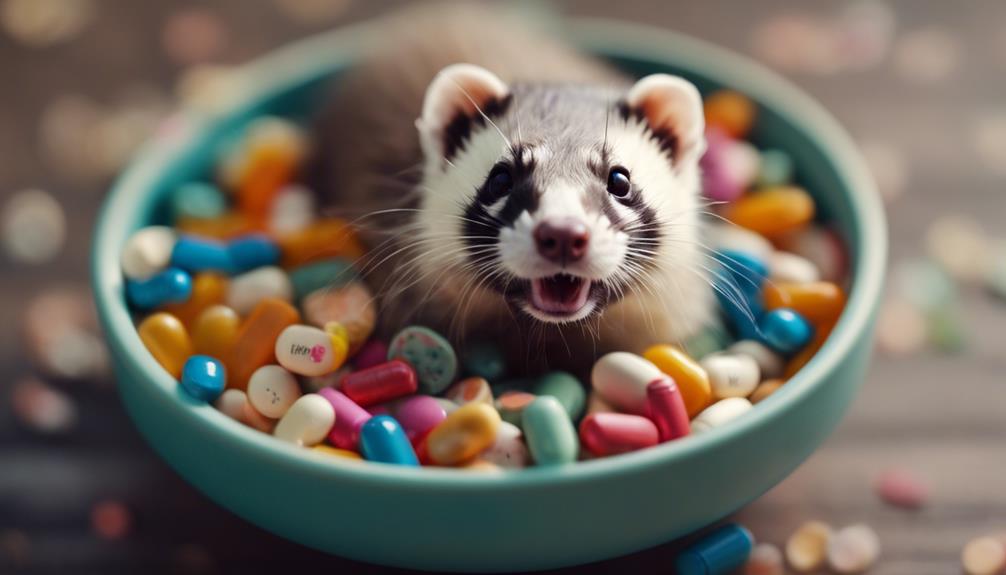
Let’s Talk about Probiotics for Your Ferret!
Do you want to keep your ferret healthy and happy? Probiotics are like superheroes for your furry friend’s tummy! Here’s why they’re so important:
- Happy Tummy: Probiotics help keep your ferret’s belly in tip-top shape by balancing the good bacteria in their gut. This means better digestion and absorbing all the yummy nutrients from their food!
- Super Immune System: By having probiotics on board, your ferret’s immune system gets a boost! It’s like having a shield to fight off bad bugs and stay strong against sickness.
- No More Tummy Troubles: Probiotics help your ferret’s digestion run smoothly, so they’re less likely to have tummy problems like diarrhea or constipation. Say goodbye to belly woes!
- Stay Fit and Fabulous: When your ferret’s gut is happy, they can manage their weight better and stay healthy. Probiotics help them keep their figure in check!
Adding probiotics to your ferret’s diet is a great way to show them some love and keep them feeling their best. So, why not give your ferret’s tummy some extra love with probiotics today?
Taurine
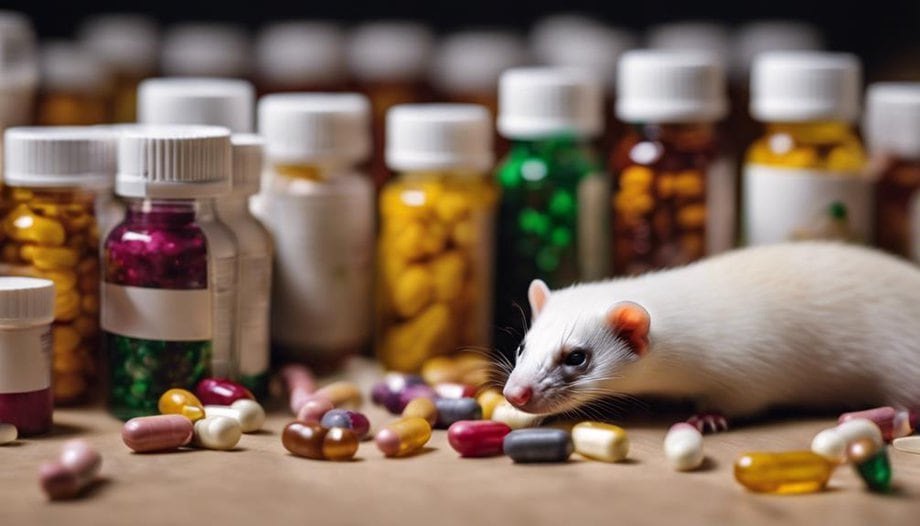
Taurine is an essential amino acid for ferrets, playing a crucial role in various physiological functions. Symptoms of taurine deficiency in ferrets may include retinal degeneration, heart issues, and reproductive problems.
It’s important for ferret owners to ensure their pets receive adequate taurine through their diet, with sources like meat, fish, and certain commercial ferret foods being rich in this vital nutrient.
Importance of Taurine
Why is Taurine Important for Ferrets?
Hey there, ferret lovers! Ever wondered why taurine is so crucial for your furry friends? Let’s dive into the world of taurine and how it helps keep your ferrets healthy and happy!
Benefits of Taurine for Ferrets:
- Healthy Heart: Taurine is like a superhero for your ferret’s heart, keeping it strong and pumping just right.
- Bright Eyes: Taurine supports your ferret’s vision, making sure they can see the world clearly and play to their heart’s content.
- Happy Tummy: Taurine helps your ferret digest their food properly and absorb all the good stuff they need to stay energetic.
- Strong Immune System: Taurine also plays a role in keeping your ferret’s immune system in tip-top shape, ready to fight off any nasty bugs.
Tips for Taurine Supplementation:
Want to make sure your ferret gets enough taurine? Here are some tips to help you out:
- Choose Wisely: Pick high-quality taurine supplements made especially for ferrets.
- Follow Directions: Always stick to the recommended dosage to keep your ferret safe and healthy.
- Keep an Eye Out: Watch how your ferret responds to the supplements to ensure they’re doing well.
- Yummy Foods: Include taurine-rich foods in your ferret’s diet to give them an extra boost.
Taurine Deficiency Symptoms
Is Your Ferret Getting Enough Taurine?
Hey there, ferret lovers! Ever wondered why taurine is so important for your furry friends? Let’s dive into how taurine deficiency can affect your ferret’s health and what you can do about it.
What is Taurine and Why Does Your Ferret Need It?
- Taurine is a crucial amino acid that helps your ferret’s body function properly.
- It’s essential for a healthy heart, sharp eyesight, and shiny fur.
Signs of Taurine Deficiency in Ferrets:
- Dilated cardiomyopathy: a heart condition that can be life-threatening.
- Retinal degeneration leading to blindness: your ferret’s eyes need taurine to stay healthy.
- Reproductive issues: taurine plays a role in your ferret’s ability to have healthy babies.
- Poor coat quality: taurine helps keep your ferret’s fur looking fabulous.
How to Keep Your Ferret Healthy:
- Make sure your ferret’s diet includes enough taurine.
- Consider taurine supplements if needed.
- Regular check-ups with your vet can help monitor your ferret’s taurine levels.
Taurine-Rich Food Sources
Where Can Ferrets Get Taurine for a Healthy Diet?
Do you know where ferrets can find the essential nutrient taurine for their overall health? Let’s explore some taurine-rich food options for your furry friends:
- Fresh Meat: Why not offer your ferret some fresh poultry, beef, or lamb? These meats are natural sources of taurine, which is vital for their well-being.
- Organ Meats: Consider adding liver and heart to your ferret’s diet. These organ meats can provide a boost of taurine to support their health.
- Raw Eggs: In moderation, raw eggs can be a great source of taurine and other essential nutrients for your ferret.
- High-Quality Commercial Ferret Food: Look for brands that include taurine as an ingredient. This can help meet your ferret’s dietary needs effectively.
Iron
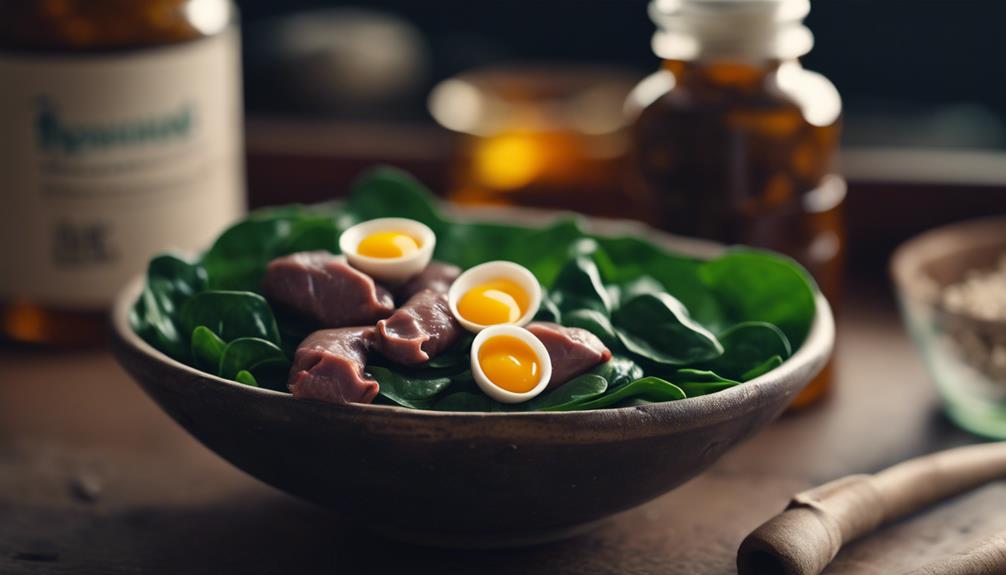
Let’s Talk About Iron for Ferrets!
Hey there, curious minds! Did you know that iron is like a superhero for ferrets? It’s a super important mineral that helps these furry friends stay healthy and happy. Let’s dive into why iron is crucial for ferrets and how we can make sure they get enough of it.
What does iron do for ferrets?
- Helps transport oxygen in their bodies
- Aids in energy production
- Supports enzyme activity for various functions
What should ferrets eat for iron?
- High-quality animal-based proteins are key
- Sometimes, iron supplements can help fill any gaps
Iron Supplements and Dosages:
- FerretVite: 1/4 tsp per day
- Nutri-Cal for Ferrets: 1/2 inch per day
- Ferretone: 1 drop per day
- Pet-Tinic: 1/4 ml per day
Important Tip:
Always check with a vet before adding any supplements to your ferret’s diet. Too much iron can be harmful, so it’s best to get expert advice.
Calcium
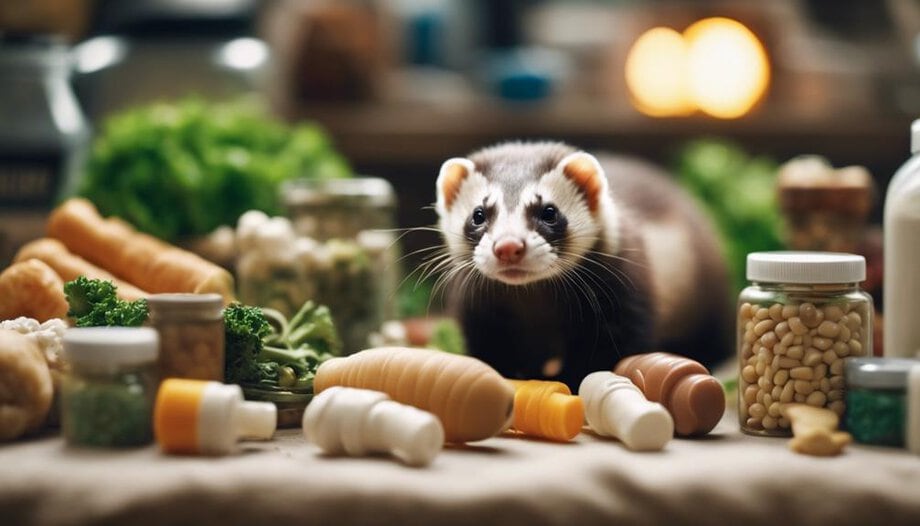
Let’s Talk about Calcium for Ferrets!
Hey there, ferret enthusiasts! Today, we’re diving into the world of calcium and why it’s super important for our furry friends. Let’s break it down in simple terms:
- Absorbing Calcium: Did you know ferrets need vitamin D to soak up calcium properly? It’s like the key that unlocks the door to good bone health!
- Strong Bones and Teeth: Calcium is like the superhero that keeps ferrets’ bones and teeth strong, preventing any nasty bone diseases.
- Move and Groove: Calcium helps ferrets’ muscles do their thing – contracting and relaxing to keep them agile and playful.
- Nervous System Support: Calcium is like the conductor in a symphony, making sure messages travel smoothly along the nerves for top-notch function.
Frequently Asked Questions
Can Ferrets Overdose on Vitamin a if Given Too Much Through Supplements?
Giving a ferret too much vitamin A can lead to toxicity. Symptoms include lethargy, loss of appetite, and potentially liver damage. To prevent this, ensure the recommended dosage is not exceeded, offering a balanced diet.
Are There Any Specific Sources of Omega-3 Fatty Acids That Are Best for Ferrets?
When considering the best sources of omega-3 fatty acids for ferrets in their diet, it’s essential to prioritize fish oil or flaxseed oil. These supplements can contribute to a well-rounded nutritional profile for your ferret’s health.
How Can I Tell if My Ferret Is Deficient in Vitamin D and Needs Supplementation?
In ferrets, recognizing vitamin D deficiency can be challenging. Watch for changes in behavior like lethargy or decreased appetite. A veterinarian can conduct blood tests to assess vitamin D levels accurately before considering supplementation.
Are There Any Potential Side Effects of Giving Probiotics to Ferrets?
Probiotics are generally safe for ferrets when given in appropriate amounts. Research supports their benefits for digestive health. Some ferrets may experience mild behavioral changes initially. Consulting a veterinarian for guidance is advisable.
Is It Possible for Ferrets to Get Too Much Taurine From Supplements and What Are the Consequences?
Balancing taurine levels in ferrets is crucial. Too much from supplements can pose risks like heart issues. Maintaining the right dosage is key for their safety. Just as a river needs the perfect flow.

